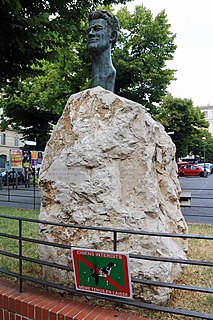A Quote by Reginald Horace Blyth
The sun shines, snow falls, mountains rise and valleys sink, night deepens and pales into day, but it is only very seldom that we attend to such things. . . . When we are grasping the inexpressible meaning of these things, this is life, this is living. To do this twenty-four hours a day is the Way of Haiku. It is having life more abundantly.
Related Quotes
Night is purer than day; it is better for thinking and loving and dreaming. At night everything is more intense, more true. The echo of words that have been spoken during the day takes on a new and deeper meaning. The tragedy of man is that he doesn't know how to distinguish between day and night. He says things at night that should only be said by day.
Rise early. Fix a time-table to which you must try to keep. One seldom regrets having made an early start, but one always regrets having set off too late; first for reasons of safety-the adage 'it is later than you think is very true in the mountains-but also because of the strange beauty of the moment: the day comes to replace the night, the peaks gradually lighten, it is the hour of mystery but also of hope. Setting off by lantern-light, witnessing the birth of a new day as one climbs to meet the sun, this is a wonderful experience
The secret of the mountain is that the mountains simply exist, as I do myself: the mountains exist simply, which I do not. The mountains have no "meaning," they are meaning; the mountains are. The sun is round. I ring with life, and the mountains ring, and when I can hear it, there is a ringing that we share. I understand all this, not in my mind but in my heart, knowing how meaningless it is to try to capture what cannot be expressed, knowing that mere words will remain when I read it all again, another day.
Four hours of prosthetics every morning, the jowls and the nose, and it was very hot so they're having to attend to it all day, and you're still petrified of so many things, such as, can I speak properly? Hitchcock never quite lost those East End vowels, even though he had the softened California consonants.
Walking on these streets, until the night falls, my life feels to me like the life they have. By day they’re full of meaningless activity; by night, they’re full of meaningless lack of it. By day I am nothing, and by night I am I. There is no difference between me and these streets, save they being streets and I a soul, which perhaps is irrelevant when we consider the essence of things
Each day is an adventure in discovering the meaning of life. It is each little thing that you do that day - whether it be spending time with your friends, running in a cross-country meet or just simply staring at the crashing ocean- that holds the key to discovering the meaning of life. I would rather be out enjoying these things than pondering them. We may never really discover the meaning of life, but the knowledge we gain in our quest to discover it is truly more valuable.
Which, I wonder, brother reader, is the better lot, to die prosperous and famous, or poor and disappointed? To have, and to be forced to yield; or to sink out of life, having played and lost the game? That must be a strange feeling, when a day of our life comes and we say, 'To-morrow, success or failure won't matter much; and the sun will rise, and all the myriads of mankind go to their work or their pleasure as usual, but I shall be out of the turmoil.'


































